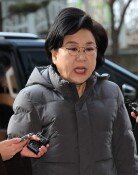Special Envoy of Human Rights to North Korea Will Probably Be a Hard-liner
Special Envoy of Human Rights to North Korea Will Probably Be a Hard-liner
Posted December. 23, 2004 23:01,
The matter of who will be appointed as the first special envoy of human rights dispatched to North Korea, which was effective from August 2003, is gaining much attention in the diplomatic sector.
The reason is that the special envoys opinion on North Korea and his relationship with U.S. President George W. Bush are understood as the hints to forecasting the direction of the U.S. policies on North Korea in the coming four years.
Among Washingtons diplomatic services, the general consensus that the keyword in next years Korean Peninsula policies will be human rights is being reached.
U.S. Ambassador to South Korea Christopher Hill said, Separate from the nuclear issue, the human rights matter will be raised continuously, in a lecture in Washington. The cardinal point of the U.S. proposal of regime transformation to North Korea is narrowed down to how the North Korean government will solve the problems of the financial difficulties of the people and the oppression of freedom.
The White House and the Senate are currently deliberating on the selection of the special envoy.
A well-informed person in Washington said on December 22, The special envoy might be appointed next January when the new session of the U.S. Congress begins.
The special envoy is obliged according to the North Korean Human Rights Act to report his/her activities to the Congress within six months from the effectuation of the act (by next April). Large-scale human rights seminars by human rights organizations of South Korea and U.S. are also scheduled to commence in Seoul and Washington next February.
The currently known criteria of the selection can be summarized as conservative personnel with a view of North Korea that is similar to President Bushs. The necessity of personnel outside the influence of the State Department to avoid the firm attitude toward the North Korean human rights is also being mentioned.
Another informed source said, The hard-liners in Congress are talking about the appointment of Jewish personnel (considering their historical experience of Holocaust).
North Korea Freedom Coalition, a human rights organization in the U.S., reported that it has recommended six people for the special envoys position. The recommended are: former U.S. Ambassador to South Korea James R. Lilley, Jewish rabbi Abraham Cooper, human rights activist Jack Randler, American Enterprise Institute (AEI) researcher Nicholas Eberstadt, former AEI researcher Chuck Downs, and President of Defense Forum Foundation Suzanne Scholte.
Seung-Ryun Kim srkim@donga.com







